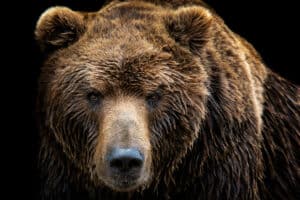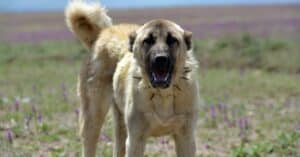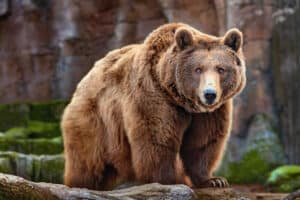Until settlers arrived in the state, North Carolina teemed with black bears. Though their numbers decreased rapidly during the first half of the 20th century, their populations are currently enjoying a resurgence. Of course, this means more opportunities for hunters to catch and kill record-breaking bruins. Read on to discover the largest bear ever caught in North Carolina!
The Largest Bear Ever Caught in North Carolina
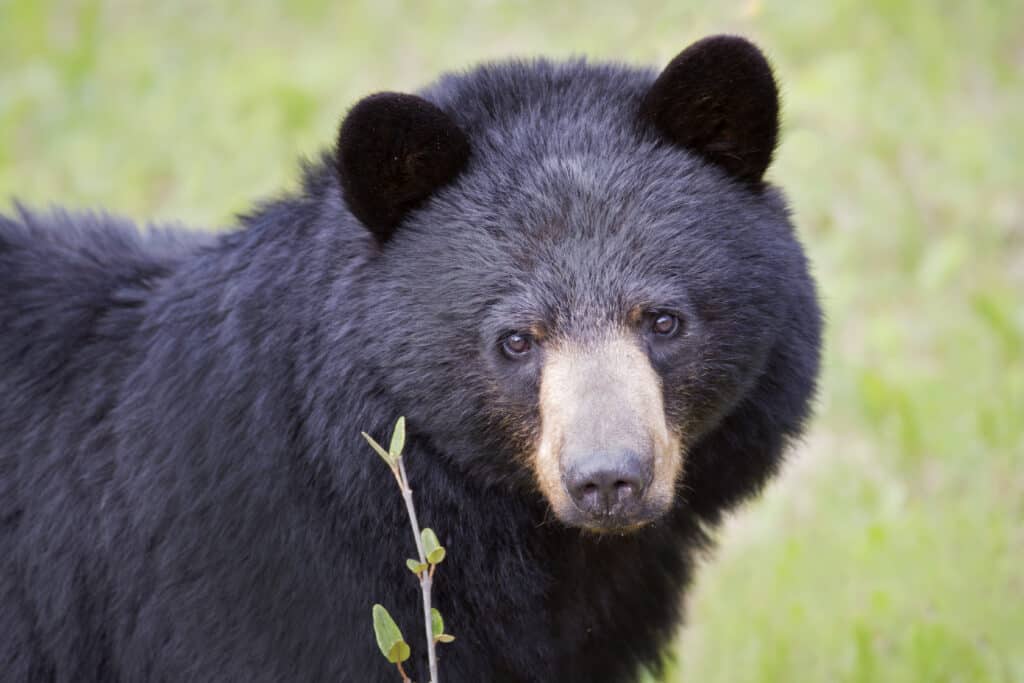
In North Carolina, the largest bear ever caught weighed 880 pounds.
©Wild Art/Shutterstock.com
The largest bear ever caught in North Carolina was an adult black bear weighing 880 pounds. It topped the previous state record by 160 pounds. Hunter Coy Parton made the kill in November of 1998 near the town of Vanceboro in Craven County. Parton took the bear with a shotgun during a hound hunt.
North Carolina is famous for its larger-than-average black bears, with coastal bears typically growing larger than those in the mountains. As an example of other huge bears in the state, hunter Thomas Capps killed another massive black bear in November of 2014 that weighed 782 pounds. The bear made history as the second-largest black bear ever killed in North Carolina. The 79-year-old Capps was a former Dominion CEO.
On October 18, 2022, young hunter Caleb Henry killed the biggest black bear ever taken to that point in Western North Carolina. The bear weighed 695 pounds, surpassing the previous record of 688 pounds from Madison County. Another hunter, Billy Walkowiak, shot an impressive black bear during a hound hunt in Hyde County. The bear weighed 647 pounds.
North Carolina Bear Types and Appearance
The American black bear (Ursus americanus) is the only species of bear in North Carolina, though the brown bear (Ursus arctos) and the polar bear (Ursus maritimus) roam across other regions of North America. Black bears on the continent come in a number of colors or “phases” including black, brown, cinnamon, blonde, greyish-blue, and white. However, in North Carolina, they tend to be black with a tan muzzle. Some individuals bear a white blaze on their chests.
Black bears in the state have an average length of five to six feet with an average shoulder height of two to three feet. Adult males typically weigh 200 to 700 pounds, though exceptional individuals may grow larger than this. Adult females are smaller, averaging 100 to 300 pounds.
Black Bear Habitat
Although black bears are capable of living near humans, their preferred habitats include dense uninhabited woodlands or swamplands. The species is highly adaptable and has spread out in recent years to inhabit approximately 60% of North Carolina’s landmass. Potential dens include hollow trees, caves, and thickets, though some bears will even take advantage of human structures or property. Black bears in the state typically den sometime from November to January and emerge in March or early April. However, male bears in the coastal plain region may remain active all winter long.
How Many Black Bears Are There in North Carolina?
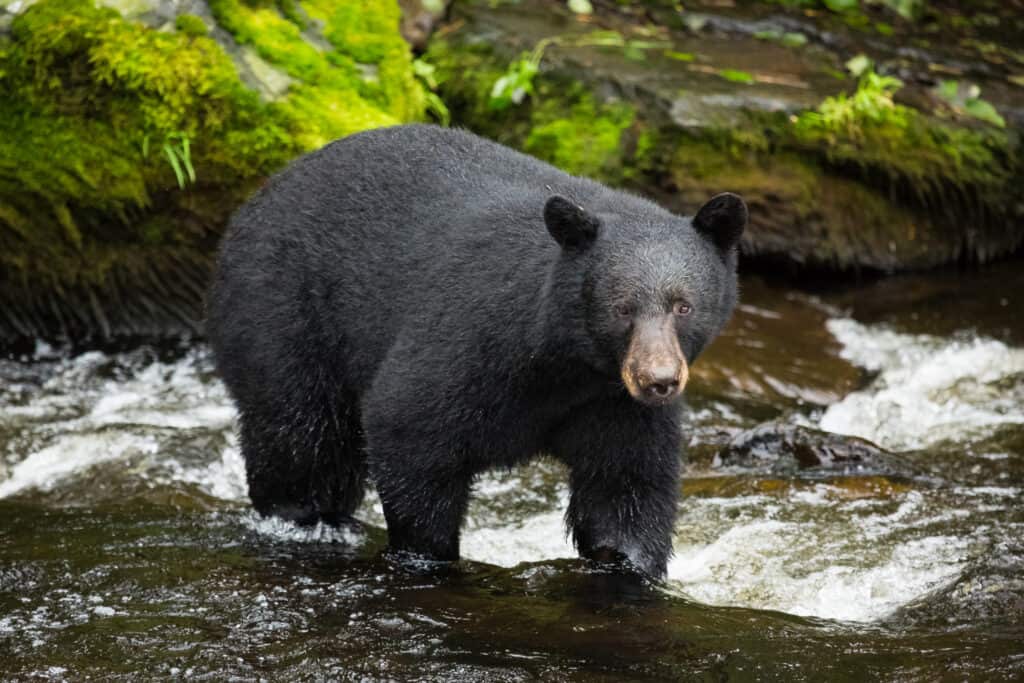
There are about 20,000 black bears in North Carolina.
©SCStock/Shutterstock.com
Currently, about 20,000 black bears inhabit North Carolina. However, like many other states across America, North Carolina once suffered a drastic reduction in black bear numbers. The initial arrival of Europeans to the state signaled the beginning of the species’ decline as many settlers hunted and killed black bears to protect their families and livelihoods. As agriculture began to pick up, many bears also suffered habitat loss. Then the 1920s American chestnut blight killed off the species’ most vital source of nuts, imperiling their numbers once again.
By the mid-1900s, black bears were seldom seen outside coastal swamps and remote mountains. More recently, conservation efforts have allowed the species to recover and thrive. Beginning in the 1970s, the North Carolina Wildlife Resources Commission played a key role by designating over 500,000 acres of land as bear sanctuaries. The IUCN lists black bears as a species of Least Concern across North America.
Is It Legal to Hunt Black Bears in North Carolina?
It is legal to hunt black bears in North Carolina with a license. Seasons vary by region. Hunting helps keep black bear numbers under control to prevent human-bear conflicts and disruptions to the ecosystem. The annual black bear harvest numbers have been generally trending upward as the statewide population continues to increase. In 2020, state hunters harvested a record 3,748 bears. See North Carolina Wildlife Resources Commission’s black bear webpage for seasons and other hunting regulations.
Are Black Bears Dangerous?
Black bears are typically only dangerous when provoked or in search of food. They are shy animals by nature, preferring to avoid human contact whenever possible. In fact, though black bears in the wild are often diurnal, those living near humans may adjust to a nocturnal lifestyle to prevent unwelcome encounters. Black bears across North America kill less than one person per year. That said, nonfatal encounters are common and occasionally lead to human injury or the death of the bear at the hands of homeowners or wildlife officials.
The best way to avoid conflict with bears is to keep your distance. Above all, never feed a black bear. They have excellent memories and a keen sense of smell, both of which allow them to pinpoint and return to locations with calorie-dense human food.
Conclusion
Visit North Carolina Wildlife Federation’s Bear Aware webpage for tips on how to live safely with black bears. Additionally, check out BearWise for more information on fostering responsible human-bear coexistence.
Up Next:
- The Largest Black Bear in History
- Discover the Largest Bear Ever Caught in Rhode Island
- Discover the Largest Bear Ever Caught in Colorado
The photo featured at the top of this post is © iStock.com/Mark Lee
Thank you for reading! Have some feedback for us? Contact the AZ Animals editorial team.



